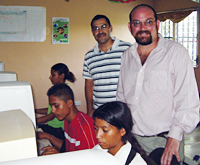| |
 |
| |
Cesar
Dubois '07, left, and Kevin Marinacci '96, guide students
in Fabretto's San Isidro computer lab. |
| |
|
Alumni
Profile: Kevin Marinacci '96
Plugging
in for promise
Kellogg
alum is helping first-generation Internet users in Nicaraguan
primary schools embrace better learning and lifelong enrichment
to benefit community
By
Romi Herron
Kevin
Marinacci says optimism can be an occupational hazard
when developing nonprofit start-up ventures. Yet the 1996
Kellogg School graduate admits that a sense of promise helps
guide his considerable passion to make a difference.
But
16 years ago in Nicaragua, when Marinacci started Father Fabretto's
Family Association, an organization improving education for
low-income families, the challenges looked daunting, even
to an optimist. At the time, the 400 children Marinacci set
out to serve faced historically bleak outcomes for learning.
Whether for basic academics like reading and writing, or necessary
trade skills like farm planning or beekeeping, half of students
didn't make it to sixth grade. In the rural areas, eight of
nine children dropped out by then.
Today,
due in large part to Marinacci's belief that providing education,
hope, shoes, uniforms, books and lunch would enable kids to
stay enrolled in school, more than 4,300 Nicaraguan children
are engaged with their dreams and advancing to higher grades.
Marinacci, now Fabretto's executive director in Nicaragua,
had cautiously hoped for such progress, but the program's
current status has far exceeded his expectations.
"It's
beyond my wildest dreams to see the success we're experiencing,
and we've attracted attention from institutional donors who
see us as having characteristics that can be replicated regionally
as well as locally," Marinacci says. "Sometimes
[problems arise because of] something so simple, such as no
access to supplies, that creates an educational barrier for
children in less developed countries. That's an unacceptable
future for a country."
In
its second phase, Fabretto set out to improve the curriculum
and teachers in the schools, Marinacci says.
"We
changed our equation. Once we attracted children to school
and to the programs, we worked on getting the excitement of
education into their hearts and minds," Marinacci says.
"Here, showing up [to school] is half the battle."
Encouraging
children to be protagonists in their academic life, and not
mere bystanders learning by rote, is part of the Fabretto
credo. "We're working very hard to make sure they are
getting the skills needed to succeed long term and improve
their family's income and the community's income," Marinacci
says.
Playing
a significant part is Cesar Dubois '07, currently enrolled
in the Kellogg
School's EMBA program in Miami. Dubois travels there for
his studies and also manages Fabretto's information technology,
which means he's helping connect Fabretto's first generation
of users to the digital online world.
"About
half of one percent of Nicaragua's population uses the Internet,
and we are now offering not only basic Windows and Internet
access with computer bays in our schools, we are also teaching
subjects such as computer repair to give students additional
skills," Dubois says. The children are proving to be
adept with concepts most had never even heard previously.
"At the beginning of the semester, they were just learning
how to turn on the computers, and now they're working with
tables in Word."
A
Kellogg alumnus at Microsoft, Ian Knox '03, facilitated a
$158,000 grant of computers and software for Fabretto. Currently,
entrepreneurial studies, English as a second language, Junior
Achievement methodology and experiential learning are programs
under development in the Fabretto curriculum.
Through a partnership with the Pan American School
of Agriculture in Honduras' Zamorano University, beekeeping,
composting, vegetable growing and other practical projects
are taught so children can learn not only the physical process
of farm skills but also the planning, troubleshooting and
math behind it. Through projects such as Growing Connections,
students will share their agricultural experiences with others
via the Internet, so the community benefits too. Someday, these children may teach their
parents and other adults to use the Internet, but because
adult literacy is low in the region, that goal may take some
time, Marinacci admits.
He
is confident, however, that Nicaragua's children hold their
country's promise in their hands, whether they reach for technological
or agricultural ways of earning a living. In 2007, Fabretto
will pilot a rural secondary education system that has been
successful in Honduras and Colombia.
"Any
time we can raise the educational level of this generation,
we can create opportunities. Nicaragua is certainly beginning
to turn the corner and attract foreign investment, but that
will be squandered unless there is investment in human capital,"
Marinacci says.
"I've
seen a lot of progress but we have a lot more to do. We're
just getting started."
|





